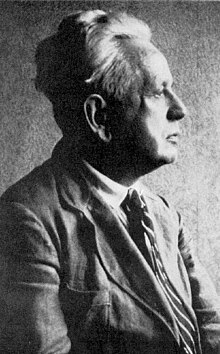Ernst Cassirer
Ernst Cassirer | |
|---|---|
 | |
| Born | July 28, 1874 |
| Died | April 13, 1945 (aged 70) |
| Era | 20th-century philosophy |
| Region | Western Philosophy |
| School | Neo-Kantianism |
Ernst Cassirer | |
|---|---|
| Scientific career | |
| Academic advisors | Hermann Cohen Paul Natorp |
| Notable students | Hans Reichenbach Leo Strauss Susanne Langer Nimio de Anquín |
Ernst Cassirer (German pronunciation: [kaˈsiːʁəʁ]; July 28, 1874 – April 13, 1945) was a German philosopher. Working in the Neo-Kantian Marburg tradition, and for many years a loyal follower of Herman Cohen, he expanded phenomenology of knowledge into a philosophy of culture, via a theory of symbols. He is one of the leading C20th advocates of philosophical idealism.
Biography
Cassirer was born in Breslau (Wrocław), Silesia, into a Jewish family. He studied literature and philosophy at the University of Berlin. After working as a Privatdozent at the Friedrich Wilhelm University in Berlin, in 1919 he was elected to a chair of Philosophy at the newly-founded University of Hamburg, where he lectured until 1933, supervising amongst others the doctoral thesis of Leo Strauss. Because he was Jewish, Cassirer left Germany when the Nazis came to power.
After leaving Germany he found first refuge as a lecturer in Oxford, before becoming a professor at Gothenburg University. When Cassirer considered Sweden too unsafe, he tried to get a post at Harvard, but was rejected because thirty years earlier he had turned them. In 1941 he obtained a post as a visiting professor at Yale University, before moving to Columbia University in New York City, where he lectured from 1943 until his death in 1945. As he had been naturalized in Sweden, he died a Swedish citizen.
His son, Heinz Cassirer, was also a Kantian scholar.
Works
In 1921, stimulated by Einstein's general theory of relativity, Cassirer claimed that contemporary science supported a neo-Kantian conception of knowledge.[1] In his review of the book Moritz Schlick[2] rejected this view. Cassirer then extended his neo-Kantianism into a more general theory of "symbolic form": aesthetic, ethical, religious, and scientific.
Philosophy of Symbolic Forms
His major work, Philosophy of Symbolic Forms (4 vols., 1923–1929) Cassirer argues (as he was to put it in his later more popular Essay on Man (1944)) that man is a "symbolic animal". Whereas animals perceive their world by instincts and direct sensory perception, man creates his own universe of symbolic meaning that structures his perception of reality. For Cassirer, the human world is created through linguistic, scientific, and artistic symbolic forms, which although shared, extend and deepen individual understanding and expression.
Philosophy of the Enlightenment
Cassirer claimed that reason's self-realization leads to human liberation. Mazlish (2000) argues however that in Die Philosophie der Aufklärung (The Philosophy of the Enlightenment) (1932) Cassirer focuses on ideas, and ignores the political and social context in which they were produced.
The Myth of the State
Cassirer's last work was The Myth of the State. Published posthumously in 1946 it traces the idea of a totalitarian state back to ideas advanced by thinkers such as Machiavelli and Hegel. He claimed that in the C20th politics there had been a return, with the active encouragement of philosophers such as Martin Heidegger, back to the irrationality of myth, and in particular the notion that there is such a thing as destiny.
Partial bibliography
- Substance and Function (1910), English translation 1923 (at archive.org)
- Kant's Life and Thought (1918), English translation 1981
- Philosophy of Symbolic Forms (1923–29), English translation 1953–1957
- Language and Myth (1925), English translation (1946) by Susanne K. Langer
- Philosophy of the Enlightenment (1932), English translation 1951
- The Logic of the Cultural Sciences (1942), English translation 2000 by S.G. Lofts (previously translated in 1961 as The Logic of the Humanities)
- An Essay on Man (written and published in English) (1944)
- The Myth of the State (written and published in English) (posthumous) (1946)
- The Problem of Knowledge: Philosophy, Science, and History since Hegel (1950) online edition
- Symbol, Myth, and Culture: Essays and Lectures of Ernst Cassirer, 1935-1945 ed. by Donald Phillip Verene (1981)
See also
Notes
- ^ Zur Einsteinschen Relativitätstheorie. Erkenntnistheoretische Betrachtungen. Berlin: Bruno Cassirer. Translated as Einstein's Theory of Relativity. Chicago: Open Court, 1923.
- ^ Schlick, M. (1921) "Kritizistische oder empiristische Deutung der neuen Physik?" Kant-Studien, 26: 96-111. Translated as "Critical or Empiricist Interpretation of Modern Physics?".
Further reading
- Barash, Jeffrey Andrew. The Symbolic Construction of Reality: The Legacy of Ernst Cassirer (2008) excerpt and text search
- Friedman, Michael. A Parting of the Ways: Carnap, Cassirer, and Heidegger (2000) excerpt and text search
- Gordon, Peter Eli. Continental Divide: Heidegger, Cassirer, Davos (2010)
- Krois, John Michael. Cassirer: Symbolic Forms and History (1987)
- Schilpp, Paul Arthur (ed.). The Philosophy of Ernst Cassirer (1949)
- Schultz, William. Cassirer & Langer on Myth (2nd ed. 2000) excerpt and text search
- Skidelsky, Edward. Ernst Cassirer: The Last Philosopher of Culture (Princeton University Press, 2008) 288 pp. ISBN 978-0-691-13134-4. excerpt and text search
